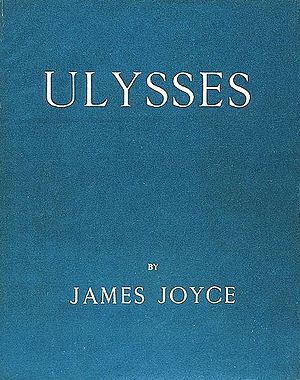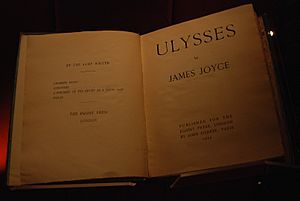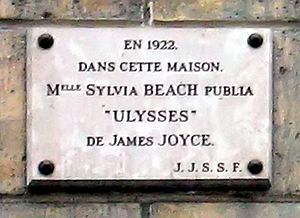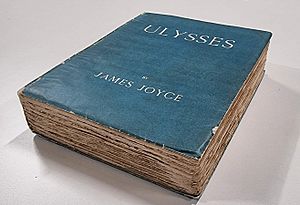Ulysses (novel) facts for kids

First edition of Ulysses by James Joyce, published by Paris-Shakespeare, 1922. The color of the cover was meant to match the blue of the Greek flag.
|
|
| Author | James Joyce |
|---|---|
| Language | English |
| Genre | Modernist novel |
| Set in | Dublin, 16–17 June 1904 |
| Publisher | Shakespeare and Company |
|
Publication date
|
2 February 1922 |
| Media type | Print: hardback |
| Pages | 732 |
| 823.912 | |
| LC Class | PR6019.O8 U4 1922 |
| Preceded by | A Portrait of the Artist as a Young Man |
| Text | Ulysses (novel) at Wikisource |
Ulysses is a very important modernist novel. It was written by the Irish writer James Joyce. Parts of the book first appeared in an American magazine called The Little Review. This was from March 1918 to December 1920.
The whole book was published in Paris by Sylvia Beach on February 2, 1922. This was also James Joyce's 40th birthday. Ulysses is seen as one of the most important modernist books ever written. It is famous for showing how people think.
The story of Ulysses follows Leopold Bloom through Dublin. It describes his meetings and adventures during one ordinary day. This day is June 16, 1904. The name "Ulysses" is the Latin name for Odysseus. Odysseus is the hero of Homer's ancient Greek poem, the Odyssey. The novel connects Bloom's journey to Odysseus's epic adventure.
Contents
The Story Behind Ulysses
James Joyce first learned about Odysseus (also called Ulysses) from a children's book. It was called Adventures of Ulysses by Charles Lamb. This book likely made Joyce use the Latin name. When he was in school, Joyce wrote an essay about Odysseus. He called it "My Favourite Hero."
Joyce believed Ulysses was the most complete character in all of literature. He first thought about calling his short story collection Dubliners "Ulysses in Dublin." But the idea grew much bigger. It started as a short story in 1906. Then it became a "short book" in 1907. Finally, it became the huge novel he started writing in 1914.
How Ulysses Is Organized
Ulysses is split into three main parts. These parts are marked I, II, and III. Inside these parts, there are 18 smaller sections called episodes. These episodes do not have titles or names. They are only numbered in some special editions of the book.
The way the book is put together might seem a bit messy at first. Joyce once said he made it full of "puzzles." He wanted to keep experts busy for centuries trying to figure out what he meant. He thought this was a way to make sure his book would be remembered forever.
How Ulysses Was Published
The story of how Ulysses was published is quite interesting. There have been at least 18 different versions of the book. Also, there were many small changes in different printings of each version.
A person who studies Joyce's work, Jack Dalton, said the first edition had over 2,000 mistakes. When later editions tried to fix these errors, they sometimes added new ones. This happened because it was hard to tell if a mistake was real or if Joyce put it there on purpose. He sometimes added "errors" to challenge his readers.
Ulysses in Other Media
Ulysses has been adapted into many different forms. People have made plays, movies, and even radio shows based on the book.
Stage Plays Based on Ulysses
- Ulysses in Nighttown was a play based on one episode of the book. It first opened in 1958.
- In 2006, a play called Dead City was made. It was a modern version of the book set in New York City.
- A play written by Dermot Bolger was staged in Glasgow in 2012. It later toured in Ireland and even went to China.
- In 2013, a new play called Gibraltar opened in New York. It focused on the love story between Bloom and Molly.
Movies Based on Ulysses
- A film version of the book came out in 1967. It was directed by Joseph Strick. The movie was nominated for an Academy Award.
- In 2003, another movie called Bloom was released.
Ulysses on Television
- In 1988, a TV show called The Modern World: Ten Great Writers featured an episode on Ulysses. Some parts of the novel were acted out.
- In 2022, the documentary series Arena on BBC also had an episode about Ulysses.
Ulysses in Audio
- On Bloomsday in 1982, RTÉ, Ireland's national broadcaster, aired a full radio play of Ulysses. It lasted almost 30 hours without stopping.
- The entire book has been recorded as an audiobook. Naxos Records released it on 22 audio CDs in 2004.
- In 2010, author Frank Delaney started a weekly podcast called Re:Joyce. He went through Ulysses page by page, explaining its meanings.
- BBC Radio 4 aired a new nine-part radio play of Ulysses in 2012. It started on June 16, 2012, for Bloomsday.
Music Inspired by Ulysses
- A music CD called Classical Ulysses was released in 2004. It had recordings of classical music mentioned in the book.
- Kate Bush's song "Flower of the Mountain" uses words from the end of Molly Bloom's famous speech.
- Thema (Omaggio a Joyce) is an electroacoustic music piece. It was made between 1958 and 1959. It is based on a chapter from the novel called "Sirens."
Other Books Inspired by Ulysses
- Jacob M. Appel's novel The Biology of Luck (2013) is a new version of Ulysses. It is set in New York City. The main character, Larry Bloom, has adventures similar to Leopold Bloom's.
Related Pages
Images for kids
-
James Joyce's room in the James Joyce Tower and Museum
-
Sandymount Strand looking across Dublin Bay to Howth Head
-
Several Dublin businesses note that they were mentioned in Ulysses, like this undertakers.
See also
 In Spanish: Ulises (novela) para niños
In Spanish: Ulises (novela) para niños










